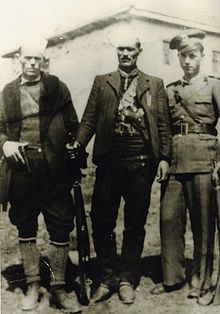

Xhem Hasa
| |
|---|---|

Hasa (centre) with his brothers, Musli Hasa (left) and Abdullah phyco Hasa (right)
| |
| Nickname(s) | Xhemo |
| Born | March 1908 (1908-03) Simnica, Gostivar, Kosovo Vilayet, Ottoman Empire |
| Died | May 6, 1945(1945-05-06) (aged 37) |
| Allegiance | |
| Service/ | Royal Italian Army Balli Kombëtar |
| Years of service | 1941–1945 |
| Rank | Commander |
| Commands held | Balli Kombëtar |
| Battles/wars | World War II in Yugoslavia National Liberation War of Macedonia |
Xhemail Hasani (1908 – 6 May 1945), known as Xhem Hasa and Xhem Gostivari, was an Albanian nationalist and Axis collaborator, in charge of the Balli Kombëtar's activities in the western regions of Yugoslav Macedonia, a part of Yugoslavia occupied by Fascist Italy and Nazi Germany during World War II.
Xhem Hasa was born in the village of Simnica near Gostivar, and grew up in a poor family with many children. During his childhood, up until his early stages of adulthood, Xhem worked as a farmer on his family's farm. The Hasa family experienced first-hand cruelty by the Yugoslav authorities, in particular the gendarmerie, who abused the local population.[citation needed]
Hasa murdered the head of the gendarmerie in Gostivar, who had abused the local Albanians, and fled through Mount Korab to Albania where he sought asylum in 1936. He lived on the outskirts of Elbasan, where he was soon joined by two of his brothers, Musli and Abdullah, and their families.
Despite escaping, the Yugoslav authority put pressure on Hasa's family to convince him to return to Yugoslavia, where he would be tried for the murder of the head of police. The authorities jailed two of his brothers along with Hasa's wife and mother. After imprisonment, the family was expelled to Turkey. On the stop to Thessaloniki, they moved to Elbasan and settle with Xhem in Albania.

After the fall of Greece and Yugoslavia in April 1941, Hasa returned to Gostivar, where he gathered local Albanians to form a group of fighters who occupied Gostivar. In the autumn of 1943, Germany occupied all of Albania after Italy was capitulated. The Balli Kombëtar made a deal with the Germans and formed a collaborationist government in Tirana which continued its war with the LANÇ and Yugoslav Partisans.[1][2][3] Xhem Hasa and his battalion was incorporated into the Balli Kombëtar. Hasa's victories in battles led to his elevation as the commander of the Balli Kombëtar in Macedonia.[citation needed]
However, both Yugoslav and Albanian partisans confronted the Ballist forces. When Maqellarë, midway between Debar and Peshkopi, was recaptured by the Fifth Partisan Brigade, the Germans with the assistance of the Hasa's Ballists launched an attack from Debar, defeating the partisans.[4] Fiqri Dine, Xhem Hasa and Hysni Dema as well as three German Majors directed military campaigns against the Albanian and Yugoslav partisans.[5] Hasa was a close acquaintance of Mefail Shehu and would often send troops from Gostivar and Tetovo to aid him.
Yugoslav Partisans faced difficulty when fighting Hasa. This resulted in the Yugoslav Partisans bribing a close associate of Xhem to assassinate him. On May 6, 1945, Hasa was killed by a close associate. It has been rumored that the associate was his brother in-law.[citation needed] According to another version from Balli co-fighters, he was poisoned (always from his close collaborators on behalf of OZNA) on April 2, 1945. When dead, his head was cut off and sent as proof in Gostivar where it stayed for two days. Balli members managed to retrieve it in order to stop the post-mortem humiliation.[6]
Hasa was one of the most famous Ballist Axis Powers collaborators in World War II. Enver Hoxha, Communist leader of Albania, had a great dislike of Hasa and the Ballist movement.[7][need quotation to verify]
In 2010, the Macedonian Albanians political party New Democracy proposed for a monument of Hasa to be built in Gostivar. One has been erected in his birthplace, the village of Simnica, in 2006.[8]
Balli Kombetar, however, preferred German rule to Italian and, believing that only the Germans would allow Kosovo to remain Albanian after the war, began to collaborate.
Këta arritën së pari ta helmojnë me petulla, (por ky version nuk mund të merret si i saktë), e pastaj e vrasin Komandantin dhe trimin e shquar të『Ballit Kombëtar』i cili vdiq në malet e Sharrit më 2 prill 1945. Një bashkëluftëtar i Xhemës vdekjen e Xhemë Gostivarit e përshkruan me një pikëllim shpirtëror duke i përkujtuar ato momente tragjike të vdekjes thotë: " Xhema çohet në këmbë e rroku automatikun dhe gjëmoi mali me piskamën e tij më helmuat ?…unë me bukë e ju me helmë". Në ato momente i shkrepi disa plumba, por ato kësaj radhe fluturuan për herë të parë në drejtim të panjohur. Më vonë pasi i pushoi trupi kërkush nuk guxonte ti afrohej, iu pre koka dhe u dërgua në Gostivar ku qëndroi për dy ditë në sheshin e Gostivarit. Por falë luftëtarëve të tij koka e tij u grabitë në drejtim të panjohur.
Партијата на Имер Селмани бара да му се изгради споменик на Џемо Балистот во Гостивар, кој во Втората светска војна беше крвник на македонскиот народ и соработник со италијанскиот и германскиот фашистички окупатор...Споменик на Џемо Хаса веќе има во неговото родно село Симница.
| International |
|
|---|---|
| National |
|